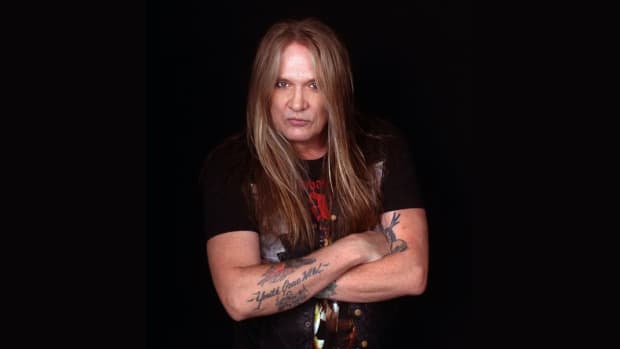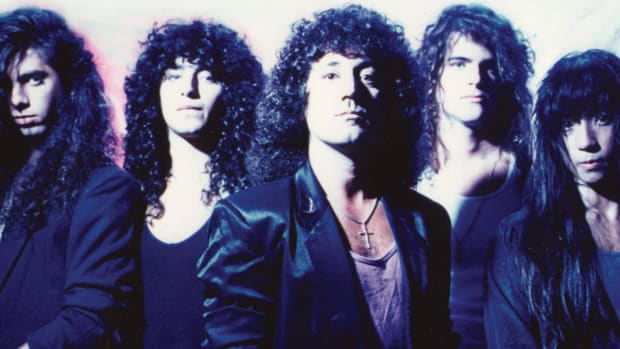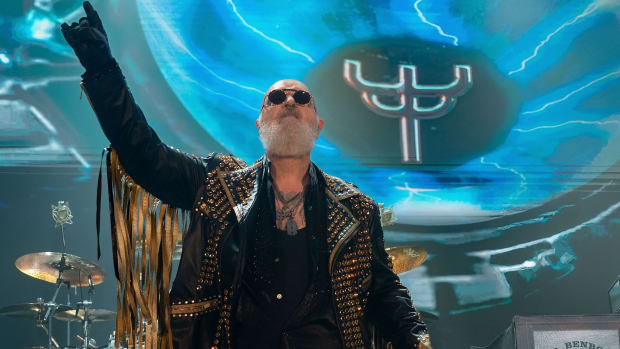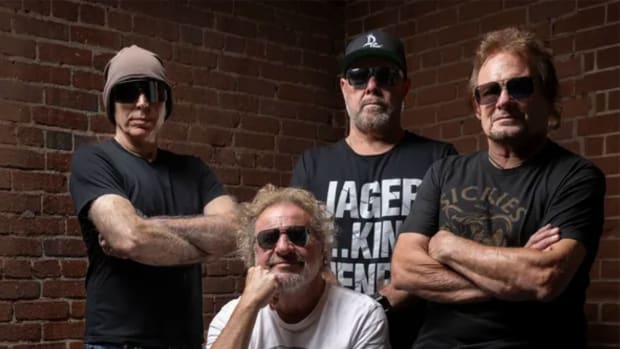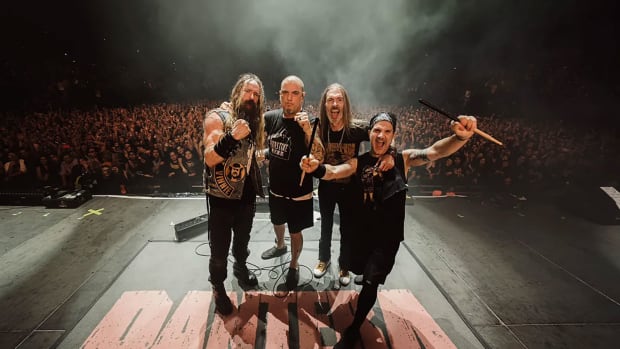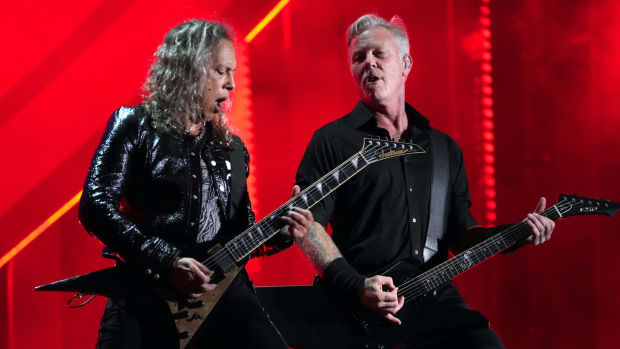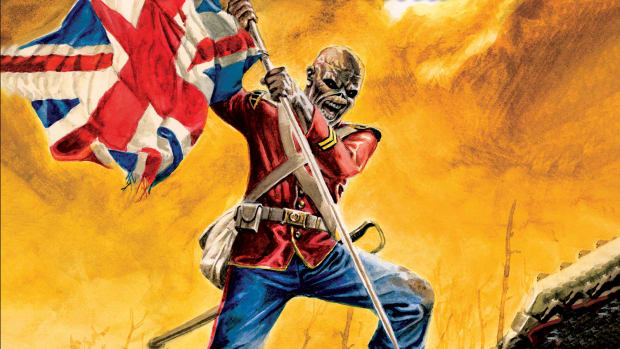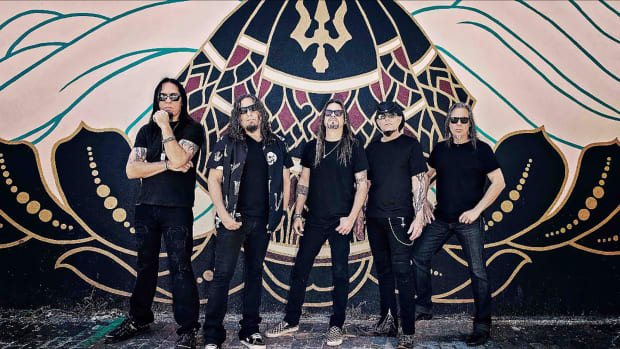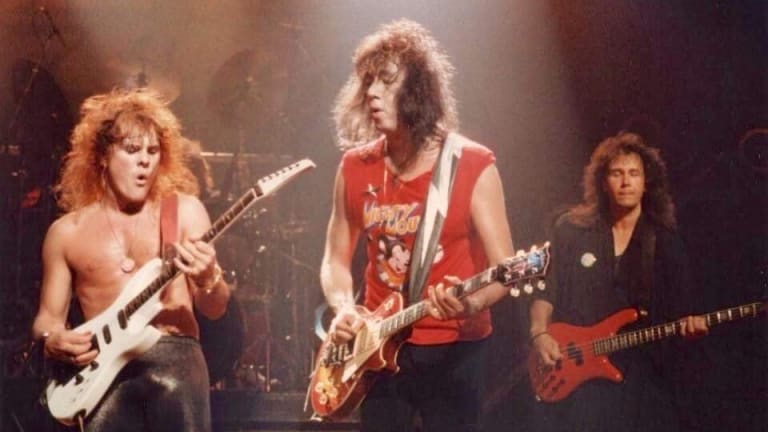
'We did the best we could': The wild story behind the making of Frehley's Comet's 'Second Sighting'
It's good to be Ace Frehley. Despite a turbulent career amid substance abuse, car chases and general wild antics, the lovable Bronx native affectionately known as the "Spaceman" has endured.
But if we dial back to the '80s, things were a bit murkier for our titular hero. Sure, he had ascended to the heavens and beyond with Kiss. Still, by the mid ‘80s, Frehley was considered old news, and years of hard living and bridge burning had left him with few options, making gigging around the Tri-State area with bassist John Regan and fellow hard-partying guitarist Richie Scarlet his primary means of taking his message to the masses.
Speaking to Metal Edge just days before his untimely passing (Regan died on April 7, 2023, at the age of 71) Regan recalled his earliest hours with Frehley: "Ace was always good to me. He wasn't always easy to deal with, but we connected as friends first, and the music part came later. I didn't know it then, but I took on a sort of caretaking role later on in the Frehley's Comet days. And I get why… Ace needed people around him that would encourage him to keep it together. So, that's what I tried to do from day one."
Things changed for Frehley after a young Eddie Trunk encouraged Megaforce Records founder John Zazula to take a chance on the rocker. With Trunk and his bandmates in Frehley's Comet – John Regan, Tod Howarth, and Anton Fig – the band hit the ground running with their self-titled debut in 1987.
To his credit, Frehley held up his end of the bargain, laying forth swells of creativity not seen since his latter days in Kiss. But more importantly, he stayed on the straight and narrow during the recording of Frehley's Comet, leading to a nearly gold record on the backside of Megaforce's “Race for Ace” campaign.
But the tour supporting Frehley's Comet was a different story, with the ever-wild six-stringer’s old habits cropping up again. By the end of the run, Frehley's demons had come back in full force. In retrospect, it's easy to see that Frehley should have taken a break to clean up. But sadly, that's not what happened. Instead, Megaforce Reocrds and the members of Frehley's Comet aimed to head back into the studio in the spring of 1988 to cut Second Sighting.
During a recent call with Metal Edge, former Megaforce man and longtime Frehley cohort Eddie Trunk recounted his memories of the initial Second Sighting sessions: "The first Frehley's Comet album was very received, falling just shy of gold. And that was encouraging because most people had questioned whether Ace could even be a viable artist anymore. He had issues with substance abuse, and most people thought Megaforce was crazy for even taking him on. But we did and ended up selling nearly half a million records, which changed people's perception. We wanted to capitalize on that, so we returned to the studio. But looking back, we probably should have waited."
While no one could have anticipated the success of Frehley's Comet, it can't be denied that Frehley's namesake was the most significant factor in its notoriety. Still, members such as Tod Howarth and John Regan played critical roles in songwriting and the proverbial "it" factor in cohesion.
To that end, former Frehley's Comet co-vocalist and guitarist Tod Howarth recalls the general vibe as "positive" and noted, "Ace had his demons, but I didn't pay much attention to them. I focused on the music rather than the clandestine various of his character, which fans rightfully love to this day."
Added Regan: "We were delighted with the first record. I think all the guys in the band would agree that we got along well. We felt that we had the potential to go on a roll. But the problem was that Ace wasn't as straight as he was when we recorded the first record. To his credit, he held it together for the tour, but I could see cracks forming. I remember being asked to try and keep Ace on track for the second record, which I think I did."
And so, as the members of Frehley's Comet entered Mediasound Studios in New York City, the general consensus was that Howarth and Regan would need to carry a much heavier load than previously thought. Further complicating matters, drummer and Frehley close friend Anton Fig, had departed for a gig with David Letterman, being replaced by Jamie Oldaker. And another close confidant of Frehley, producer Eddie Kramer, was not aboard for Second Sighting, either. This would lead to a more band-oriented record, but this approach also had inherent risk, considering the project's success was linchpinned on Frehley's explicit involvement.
"There are two ways to look at it," Trunk recalls. "On the one hand, you had Ace's name on the jacket, so that was what would sell records. But on the other hand, Frehley's Comet was always supposed to be a band, not a solo project. The only reason the first record even said 'Ace Frehley' on the front cover was because Atlantic got nervous that it wouldn't sell without it. But after the success of the first record, along with Ace clearly struggling, we thought it was time to pursue the band thing, and to their credit, John and Tod truly carried things. I believe Second Sighting doesn't get done without those two."
One look at Second Sighting's ten-song track listing shows Trunk's sentiments to be true. Five tracks were penned or co-penned by Howarth, and Regan co-wrote three. As for Frehley, he chimed in with four co-writes and one song written on his own, the aptly titled "Juvenile Delinquent."
"You have to remember that Ace wasn't a prolific writer at that point," Howarth says. "That's not to take anything away from Ace; it's more indicative of where we were at during those sessions. The other thing was that Ace got sick during Second Sighting, which left him completely absent during much of its production."
Recalling the increased participation on Howarth's end, Eddie Trunk recalled the state of popular music at the time also factored into the band and label's thinking: "You have to remember that we were in the heart of the MTV era. And Tod had that look and sound. We figured, 'Okay, let's lean on Tod more and see about him singing more songs.' And Tod was very into it; he wanted the spotlight, too. So, he came in with plenty of material. We also saw this as us furthering the idea of reinventing Ace and driving home the whole thing within the context of that era."
"But what hurt things was Ace regressing into old habits," Trunk laments. "I was kind of oblivious to it at first, but as I started to see and hear that Ace wasn't at the studio, and then that he wasn't coming up with much material, or material that wasn't very good, I knew that we were starting to lose him. We had a tough time getting Ace to stay focused, let alone engaged. The thing to do was probably put the breaks on and get the main guy healthy, but we just pushed forward and leaned on Tod and John, which reshaped the entire sound and look of Second Sighting."
With Frehley's behavior erring toward erratic and his presence in the studio limited due to sickness and remerging substance abuse issues, Howarth and Regan took the bull by the horns – not just from a songwriting standpoint, but from the perspective of keeping Frehley on task when he did appear in the studio.
"Like I said earlier, Second Sighting does not happen without Tod and John," Trunk insists. "It truly was their record. But John was even more critical because he kept Ace on track when he showed up. John and Ace had a history, and maybe his most significant role in that band was as a stabilizing influence over Ace, who wasn't always so stable. And that was huge because Ace was not healthy, focused or sober. A lot of the weight in terms of songwriting, singing, and playing guitar fell on Tod. And the rest was on John in terms of extracting things from Ace. To their credit, they embraced it."
Regan seemed to echo Trunk's recollection: "Having been with Ace since he started gigging again, I had learned how to handle him. But I also knew that he was volatile. Ace is a great guy, but he was a handful while drinking and doing all that stuff. I remember telling Ace to relax, close his eyes and lay on the floor to get some of the vocals done on Second Sighing. And I have to give a lot of credit to Tod; he recorded a lot more guitars on Second Sighting than people realize. Ace just wasn't up to the task on some days, but we had a record to make."
Given Frehley's status as one of the more influential guitarists of his generation, the revelation that he was unable to execute his leads on many of Second Sighting's tracks is probably a bit disheartening for some. Still, it's the reality that team Frehley faced back in '88, and if not for those around him, Megaforce may have pulled the plug on the whole shebang.
When asked how much guitar Frehley actually laid down for Second Sighting, Trunk admits, "Not a lot. I mean… I haven't listened to Second Sighting in a long time, but I remember that a lot of the material Ace was bringing in was not great. And his performances were not great, either. It took a lot for him to get to the studio because he wasn't well physically. I remember having to work very hard even to get Ace to show up. And then he'd get there, be unfocused, or forget what was happening."
Frehley showing up was the least of the problems considering the guitarist's state when he arrived. To that end, Trunk said: "One thing that I'll never forget was the day I came into the studio to check on Ace, and when I got there, he was sitting behind the console in a swivel chair. He was recording a guitar part behind the desk while chewing on this massive bagel with cream cheese. And in the middle of the take, he stops, grabs the bagel, and takes this huge bite, and as he's swinging around to talk with me, this big blob of cream cheese squirts out and drops all over the strings and pickups of his Les Paul. He just looked down and started cackling. What could I do? So, when I think of Second Sighting, I don't just think of something falling apart; I think of that bagel falling apart all over his guitar, too. It was a great metaphor."
Troubles aside, with his bandmates' help and Megaforce's support, Second Sighting was finished by the late spring of 1988. And despite Ace’s indifference and escalating substance abuse issues, hopes were relatively high for the record. But it didn't take long for the commercial and critical pendulum to swing the other way for Second Sighting, leading to Megaforce hitting the proverbial panic button.
"I think we all knew deep down inside that Second Sighting wasn't the record that we should have been putting out as a follow-up," admits Trunk," But again, I want to pay respect to Tod and John because there wouldn't have been a record period without them. It's just that, in retrospect, the best thing to do would have been to put the brakes on and get Ace the help he needed. It was hard to sell a record that featured so little of what made Ace famous. The Tod stuff was great, and he did an excellent job; it's just not what people expected, and it was hard to sell. We realized that if we had ten songs, Ace had to sing at least eight. That's what was going to drive things. We also realized that maybe Jamie wasn't the right drummer. That's why we got Anton [Fig] back for the next record, Trouble Walkin’.”
Once again, Howarth echoed Trunk's sentiments, admitting, "The record probably didn't go down as well because the diehard Ace fans felt my contributions infringed on what Ace did in the written and prepared song department. And I'll admit, we should have made a heavier record. And losing Anton Fig's thunder was a big part of that, too. But I came in prepared and ready to deliver and was at the top of my game. But Ace and I had very different styles, but I felt that even with Ace singing, we could still recognize his signature guitar work. But the label felt that he should do most of the singing. Going forward, I was told that they wanted Ace to do most of the writing and singing, leaving me with few options other than to leave."
When we look back on Frehley's Comet, one can't help but wonder what could have been. With an enigmatic but great guitarist in Frehley, a capable songsmith in Howarth, and a world-class bassist in Regan, the sky seemed the limit. And in fairness to Second Sighting, cuts like "Insane," "Separate" and "It's Over Now" are as good as anything on the first Frehley's Comet record.
But no matter, Second Sighting failed to launch, seeing to it that Howarth was eventually replaced with old friend Richie Scarlet the following year. But it wasn't all negative. Frehley's next record, 1989's Trouble Walkin', served as a true return to form in terms of focus and creativity for Frehley. But that doesn't mean Second Signing doesn't still hold water some 35 years after its initial release.
“I know some people like it," Trunk says. "And I'm proud we got the record done given the circumstances. I have fond memories of that time, but I can't honestly say that Second Sighting is a great record. It was great times, great memories, and great friends, but the ball got dropped there. It really was a case of what could have been. Had we waited and made a great second record, who knows what the trajectory could have been? But unfortunately, none of that happened. I do think; at the end of the day, it was a misstep. Once ‘Insane’ didn't do as well as we'd hoped, that became obvious. So, many mistakes were made, even if everybody had the best intentions."
As for Howarth, despite his significant contributions to Second Sighting, his lasting memories of the experience seem to center around his fallen friend, and longtime bandmate, John Regan: "John was not only a great bass player but a shrewd businessman. He knew what had to be done and pushed things to the limit of his abilities on that record, producing results. He had a vision and knew that most in our camp would pull through to make it happen. John was the reason I was in Frehley's Comet, and he was a huge reason we got to that point. John was deeply loyal, and Ace was lucky as he was one of his best musical allies."
When asked to give his final impressions on Second Sighting, Regan said, "I think we did the best we could given the state of things, you know? I'll tell you this – it wasn't easy. Ace was Ace, and with that comes all sorts of challenges. Tod and I did our best to make a good record, but it wasn't received well. But was it the right record? I don't know if I can answer that. I guess the sales say it wasn't, but it was the record we could make then. We did our best to keep something we all believed in afloat. We did it for each other as much as for Ace. I have no regrets.”
